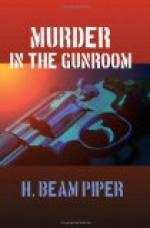“The murderer of Lane Fleming is also guilty of the murder of Arnold Rivers,” Rand stated. “I know that positively, now. Murder is punished capitally, and one of the peculiarities of capital punishment is that it can be inflicted only once, on no matter how many counts. If our man goes to the chair for the death of Rivers, the death of Fleming might even remain an accident. I can hardly guarantee that; I have my agency license to think of, among other things. But I feel reasonably safe in saying that I could keep the Premix Company from figuring in the case. Would that satisfy you?”
“It most certainly would, Colonel Rand!” Goode’s voice shook even more. “Are you sure?”
“I’m not sure of anything. It’ll cost the Premix Company some money to get this done—I’ll have certain expenses, for one thing, which could not very gracefully be itemized—and I will have to have your cooperation. Now, I want you to remain at home, where I can reach you at any moment, for the rest of the day. I’ll call you later.”
He listened to Goode babble his gratitude for a while, then terminated the call and hung up. Then he transferred the Colt .38 to the side pocket of his coat, picked up one of the sheets on which he had been listing the collection, and sat for almost fifteen minutes pretending to study it, keeping his eyes shifting from the hall door to the spiral stairway and back again.
Finally, the hall door opened, and Anton Varcek came in. Rand half rose, covering the Czech from his side pocket; Varcek came over and sat down in an armchair near the desk. He was looking more than ever like Rudolf Hess. Rudolf Hess on the morning of the Beer Hall Putsch.
“Colonel Rand,” he began. “There has, within the last half hour, been a most important development. I am at a loss to define its significance, but its importance is inescapable.”
Rand nodded. He had been expecting somebody to give birth to an important development; the steps toward gunfire were progressing in logical series.
“Well?” He smiled encouragingly. “What happened?”
“After you and the ladies left the dining-room,” Varcek said, “Fred Dunmore turned to me and apologized for harboring unjust suspicions of me in the matter of Lane Fleming’s death. He said that he had been unable to understand who else could have murdered Lane, until you had pointed out to him that the house could have been entered from the garage, and the gunroom from the library. Then, he said, he had had a conversation with some unnamed gentleman at the party last evening, and had learned that Lane had discovered that Humphrey Goode was deceiving him, and had been about to have him dismissed from his position with the company, and to sever his personal connections with him.”
“The devil, now!” Rand gave a good imitation of surprise. “What sort of jiggery-pokery was Goode up to?”
“Fred said that his informant told him that Lane had proof that Goode had accepted a bribe from Arnold Rivers, to misconduct the suit which Lane was bringing against Rivers about a pair of pistols he had bought from Rivers. It seems that Goode was Rivers’s attorney, also, and had been involved with him in a number of dishonest transactions, although the connection had been kept secret.”




